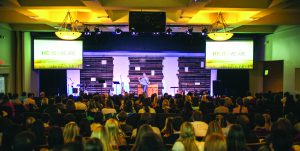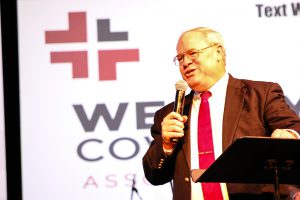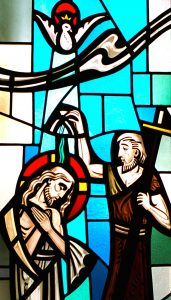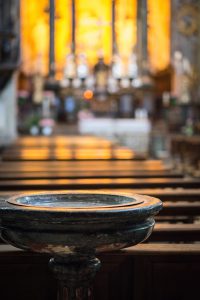
by Steve | Jul 10, 2017 | July-August 2017, Magazine, Magazine Articles

Rev. Rob Renfroe
By Rob Renfroe-
For 50 years, Good News has made a commitment to open dialogue about the divisive issues within The United Methodist Church. These topics include Sunday school curriculum, global ministries, theological pluralism, seminary education, ministry with women, and issues surrounding marriage and sexuality. Our staff and members of our extended supportive network have been faithful partners in most of the major face to face discussions about these issues with boards and agencies, as well the work of the General Conferences and annual conferences.
While we are committed to an evangelical and traditional viewpoint, we have respectfully listened carefully to other viewpoints at dialogue tables. We may not always agree, but we put a high value on engaging the issues and listening to those who do not share our perspective. Nevertheless, it does get wearisome to hear some of the same old arguments as if they are new revelations able to reconcile our differences, change the narrative, or convince those of us on one side of the argument that we’re wrong. Let me give you a few examples.
“It’s about people.” Progressives use this line, many sincerely, to remind traditionalists that our theological perspectives regarding LGBTQ issues impact the lives of real, often vulnerable people. It is something we need to remember. When we talk about homosexuality we must do so with the knowledge that people who may have been mistreated or demeaned because of their sexual attractions are listening. We are committed not to use language that appears to deny their humanity, their worth, or how much God loves them.
Unfortunately, too often the intent of the phrase goes deeper than telling us to be careful with our language. It is used to undercut our theological perspective. In fact, it is sometimes used to tell us that it is wrong to express any belief that makes others uncomfortable or causes them to question their sexual practices or desires. The charge alleges that if we hurt someone’s feelings or cause them to consider whether their sexual practice – heterosexual or homosexual – is outside the will of God, we have done wrong by doing harm to “real people.”
Even if I agree that “it’s about people,” I can still disagree that what is most important about people is how they feel about themselves or how they identify sexually. Our discussion around sexuality does impact the lives of real people – and what’s most important about people is not if they feel good about themselves but if they stand right before God.
One option is presented by those who, in the name of Christ, tell people that they must be true to themselves even if it means engaging in behavior the Scriptures teach to be displeasing to God. The other option says we must take up our cross, deny our sinful desires, and follow Jesus. Which option is more harmful?
As Christians, our first question is not what brings us happiness but what pleases God. Granted, our discussion about sexuality is about people, but ultimately it’s about real people who will stand before a holy God and will either live with or without him for eternity. We will all need grace when that moment comes. But the last thing I want to tell people is that they should continue in sin and presume on the grace of God.
We traditionalists must be very careful with our language and never speak in a way that demeans other human beings, even when we speak about sin and repentance. At the same time, I would appeal to my progressive/revisionist friends not to promote what is contrary to the will of God.
“Why can’t the denomination handle our differences the way we do in my local church?” Pastors who say this mean that their congregation has different opinions regarding marriage and sexual practice and they remain together in love and ministry. Why can’t the UM Church do the same? My response to such pastors is always the same: What would happen in your local church if you or another pastor on your staff performed same-sex weddings in your sanctuary on Saturdays? What would happen in your church if your pastor was married to someone of the same gender? It is safe to assume that some of your people would leave. Others would stop giving. Your congregation could very well become angry, divided, and much less effective in ministry.
Well, that is where the denomination is. We do not just have different opinions, we have different practices. Pastors are marrying gay couples with the approval of their bishops. And annual conferences are knowingly ordaining partnered gay persons even though the Book of Discipline and the Judicial Council say they should not. Progressives believe that traditionalists are denying justice to LGBTQ persons and they cannot live with that. We believe some are promoting sin, denying biblical teaching, and breaking our covenant. And that is why we cannot ignore our differences and act like all is well as your local church does.
Another rhetorical device centrists and progressives use is to ask the question, “Can’t we imagine another way of handling this situation?” Unfortunately, the question is most often asked by those who fancy themselves intellectual, creative, and above the fray. My response? “What have you imagined that solves our problems in a different way?”
For nearly five decades, bright and sincere people on all sides of the issue have tried to think of different ways to resolve our differences regarding marriage and sexuality. Up to this point no one has been able to imagine a solution that has brought us together. Is it possible to imagine another way of solving our division? I guess so. But you do not solve the problem by just asking the question. You solve the problem by coming up with a solution.
What if someone had told Dr. Martin Luther King Jr., “Can’t we imagine a different way of resolving our racial division other than persons of color possessing equal rights?” He surely would have responded, “No, justice is the only solution.” That is exactly how progressives within the UM Church see themselves. They are fighting for justice and equal rights within the church for gay persons wanting to be married and ordained.
Out of respect, the question should be asked of progressives if they can imagine a solution they can live with that does not require gay ordination and gay marriage. My guess is the answer you will receive is a clear and emphatic “no.”
Finally, “We’re better together.” This statement simply does not appreciate the deeply held, sincere beliefs of traditional, orthodox United Methodists. We are seeing faithful members leave the church every day, some after 70 years of being Methodist, because of our division and the rebellion of jurisdictions, annual conferences, bishops, and pastors. But we are pained to be in a church where segments dismiss the Bible as out of touch, promote what the Scriptures teach to be contrary to God’s will, and preach a theology more in sync with Unitarianism than United Methodism. Not all progressives do so, but enough do that we feel our doctrinal core is being undermined. And lay people in the pews are beyond exasperated when they see church funds used by our boards and agencies for a progressive political agenda rather than the Gospel of Jesus Christ.
I have heard clergy colleagues follow up by saying, “Our theological differences make our fellowship richer and deeper.” If that were so self-evident, why have we not joined up with the Calvinists, the Baptists, and those who do not believe in women’s ordination, or infant baptism. “But they’re not like us,” they would respond. The stark differences, however, within our own denomination over scriptural authority, Christology, and sexuality are dramatically highlighting the fact that we are two different churches with the same name.
My wife and I are better together. We are very different. She is artistic and a global thinker. I am more literal and linear. Sometimes those differences create tensions, but we work through them and we come to see the world in a more complete way than we would if we saw it through our own eyes only. But both of us are committed to keeping our marriage covenant. We would not be better together if one of us was cheating on the other and then shaming the other for not agreeing to change our marriage covenant to permit cheating.
What more can be said that has not been said over the past fifty years? We cannot have the same conversation that has failed to move us forward or resolve our differences. “You’re bad and I’m good.” “I’m right and you’re wrong.” “Listen to the stories of LGBTQ people and you’ll change.” “Read the Bible and you’ll admit you’re wrong.” We’ve done that ad nauseum. Isn’t it time for a different conversation, one that begins, “How can we stop fighting and set each other free to pursue what we believe God is calling us to do?”
Rob Renfroe is the president and publisher of Good News.

by Steve | Jul 10, 2017 | July-August 2017, Magazine, Magazine Articles

Photo courtesy of The Orchard.
By Walter Fenton-
The largest local church in the Mississippi Annual Conference in terms of worship attendance and one of the 25 fastest growing churches in the U.S. has now officially exited The United Methodist Church. According to lead pastor Bryan Collier, The Orchard Church (Tupelo) reached a settlement with conference leaders that made its departure official as of May 19, 2017.
The congregation agreed to pay 100 percent of its 2017 apportionments and to release the annual conference from all financial and legal liabilities. In turn, the conference has released the congregation from the trust clause. Therefore, The Orchard now has complete and unfettered ownership of its property and assets. (Local UM churches hold their property and assets in trust for the annual conference in which they reside, and would normally have to surrender the property and assets if they decided to leave the denomination.)
“There was just no question among [The Orchard’s] leaders that this was right move for us,” said Collier. “Our departure was not about the homosexuality issue per se, but about the general church’s inability to deal with it. Unfortunately, its failure became an enormous distraction to the kingdom work our congregation is called to do.”
“The Orchard fully embraces, as it does with all people, its need to minister to those who identify as gay, lesbian, bisexual, or transgendered, and with their families and friends as well,” said Collier. “But the denomination was not helping us do that. The Judicial Council’s recent, convoluted decision is emblematic of [the UM Church’s] inability to put the disagreement to rest. We didn’t want to let this one issue distract us anymore. We know the arguments on both sides, we’re clear in our hearts and minds where we stand, and we’re prepared to move forward accordingly.”
The multi-campus church has facilities in Tupelo, Baldwyn, and Oxford, and averages over 2,600 in worship attendance. Collier is the congregation’s founding pastor, and he and the church are celebrating 20 years of ministry together this year.
At the same time, Getwell Road UM Church in Southaven, Mississippi, also gave notice of its plan for an exit. Collier and the Rev. Bill Beavers, Getwell’s senior pastor, characterized their negotiations with Bishop James E. Swanson Sr., the episcopal leader in the Mississippi Area, and other conference officials as peaceful and civil.
Collier noted that there was no good model for a congregation that wants to leave honorably and without rancor, so both parties had to be creative. “Everyone in the process has tried hard to be God honoring,” said Collier. “We’re most appreciative of the tone of the conversation between ourselves and the conference’s leadership. It was peaceful because both sides were committed to making it so.” Getwell exited the denomination on June 4.
The Rev. Victoria White, Director of Connectional Ministries and Communications for the Mississippi Annual Conference, said, “We encourage everyone to keep the congregations at The Orchard and Getwell Road, and the entire Mississippi Annual Conference in their thoughts and prayers.”
Walter Fenton is a United Methodist clergy person and an analyst for Good News.

by Steve | Jul 10, 2017 | July-August 2017, Magazine, Magazine Articles

The Rev. Keith Boyette addresses a Wesleyan Covenant Association gathering in Memphis, Tennessee. Photo by Steve Beard.
The Wesleyan Covenant Association (WCA) has named the Rev. Keith Boyette as their first president. Boyette is a member of the Virginia Annual Conference and founded the Wilderness Community United Methodist Church 19 years ago. For eight years, Boyette served on the Judicial Council, known as the “Supreme Court” of The United Methodist Church, and was elected by his peers to serve as secretary of the Council. Prior to responding to God’s call to ordained ministry in the UM Church, Boyette was a practicing attorney in Virginia and Kentucky.
“We are very pleased to have Keith as our first president,” said Dr. Jeff Greenway, the Chair of the Wesleyan Covenant Association Council and pastor of Reynoldsburg (Ohio) United Methodist Church. “He has been an integral member of the team that cast the vision for the WCA from the very beginning and is committed to the renewal of the church. He has vast experience in our denomination, and has demonstrated an ability to relate to a wide variety of people. He embodies our commitment to vibrant, evangelical, orthodox, Wesleyan Christianity, and to renewing the theology and practice of our denomination.”
Boyette most recently served as counsel to Mrs. Dixie Brewster before the Judicial Council in her petition to nullify the election of Bishop Karen Oliveto (page 34).
“I am humbled and excited by the opportunity to begin my service as President of the Wesleyan Covenant Association,” said Boyette. “I have contended for the advancement of evangelical, orthodox, Wesleyan Christianity throughout my adult life. This is a crucial season for those committed to a vibrant expression of the Christian faith that is true to the best of our heritage as we seek the most beneficial outcome for maintaining our beliefs with the approaching Special General Conference in February 2019. I look forward to working with others to ensure that we have deeply committed leadership possessing a fervent passion for the cause of Christ and to connecting churches, clergy, and laity in this endeavor.”
“Building a new organization from the ground up is what Keith does,” said the Rev. Carolyn Moore, the vice-chair of the WCA Council and pastor of Mosaic UM Church in Augusta, Georgia. “He comes to the WCA after 19 years of successfully planting and developing a healthy, creative expression of ‘church’ in Virginia. Having him in the lead as we craft a net wide enough to hold everyone ready to do a new thing is a real grace. I’m grateful to Keith for his willingness to step up and take us into the next Methodism.”
The Wesleyan Covenant Association was formed and their governing Council was elected at a gathering of 1,800 persons last October in Chicago. In its first seven months of existence it has grown to have membership from every Annual and Central Conference in United Methodism. Naming Boyette as president is the next step in the development of this growing organization that is committed to the theological and practical renewal of the UM Church.
Wesleyan Covenant Association press release. Editor’s note: The Rev. Keith Boyette is a former board member of Good News.
![My Joshua Tree]()
by Steve | Jul 10, 2017 | July-August 2017, Magazine, Magazine Articles

Photo by Steve Beard
By Steve Beard-
Thirty years ago, I drove 500 miles with college buddies to see U2’s “Joshua Tree” tour stop in Houston. “I can’t change the world / But I can change the world in me,” Bono had sung on a previous album. Young and idealistic, I believed it then. Strangely, I still believe it today. I’ve never forgotten that night – nor the long drive back to get to class the next day. U2 was recently back in Houston to mark the anniversary of the album that arguably handed them the keys to the kingdom of global rock stardom – #1 album in 23 countries. I’ve written extensively about these Irishmen over the last 20 years, but this full-circle “Joshua Tree” tour still triggered moments of emotional daggers-through-the-heart, tribal fist pumps, and Pentecostal hanky waving – transcendence.
The album concept was titled after a prickly and ungainly desert tree named Joshua by settlers because it resembled the Old Testament prophet’s out-stretched arms toward the heavens and deep roots – strangely symbolic for an Irish band from a country divided with sectarian barbwire and religio-political quagmires. Raised by a Protestant mother and a Catholic father, Bono lived the brutal divide. With the loss of his mother at age 14, he grew up under the weight and anguish of tragedy. Then there was the whirlwind of a charismatic revival among some of the bandmates and the stirring of a struggle between rock ‘n’ roll’s narcissism and an unseen kingdom where the first shall be last and the backstage passes are given to those who honor humility as a prime virtue.
Through all this, Bono remains rock ‘n’ roll’s most effective spiritual provocateur. He sees every stage as a pulpit and every coliseum as a cathedral. He talks breezily about the theological superiority of grace over karma to jaundiced rock journalists, launched the humanitarian One Campaign (one.org), and recently wrote the forward to the Bible paraphrase The Message. “My religion could not be fiction but it had to transcend facts,” Bono wrote in a forward to the Psalms in 1999. “It could be mystical, but not mythical and definitely not ritual.”
U2 has sold more than 170 million albums, collecting 22 Grammys along the way. This world tour features a stunning visual spectacle with a 200 x 45 foot high-def LED screen choreographing imagery with the music. For me, three vitally essential images stood out.

Photo by Steve Beard
First, a Salvation Army brass band accompanied U2 during the haunting “Red Hill Mining Town.” Never before played live, the song is about the devastation and helplessness of an unemployed miner. “Love, slowly stripped away/ Love, has seen its better day.” The Salvation Army is the most reliable global Christian symbol for faith in action – soup, soap, salvation, and loud music. Under the 150 year old banner of “Blood and Fire,” this ministry – operating in nearly 130 countries – has extended the hand of grace to the down and outers, prostitutes, alcoholics, morphine addicts, unwed mothers, and victims of human trafficking. The original plan was for a brass band to play at every stop on the tour, but the film of them playing in the Santa Clarita Valley of California provides a keen juxtaposition about U2 identifying with the historic message of Salvation Army founders William and Catherine Booth that help is only a drumbeat away (salvationarmyusa.org).
“This was a privilege to be a part of and so much fun to film,” Jacqui Larsson, a member of the ethnically diverse Salvation Army band from Southern California, told me. “It was great to represent The Salvation Army to such a wide audience. We have already heard a few stories of how this video has had a huge impact on people’s lives in a way we had never expected.”
In a long list of poignant moments, the second occurred when we were introduced to Omaima Thaer Hoshan, a 15-year-old Syrian girl in a refugee camp in Jordan. In the midst of the chaos of her circumstances, she voiced her aspirations and hopes for a better tomorrow. A gargantuan banner with her face is passed hand-to-hand throughout the stadium. It’s a not-so-subtle reminder that there is a hellhole on the other side of the globe. At bare minimum, pray for her safety and be grateful you are not where she is.
 Lastly, during a visual montage of notable female politicians and musicians (Sojourner Truth, Patti Smith, Angela Merkel, etc.), one stood out as a sister-in-arms with U2’s sonic art. Sister Rosetta Tharpe (1915-1973), a personal heroine, was the undisputed queen of rock and gospel music, shredding an electric guitar and boldly taking her sanctified skills and songs outside the four walls of the church – taking church to the people. Keep the faith, she would say to U2, and rock on. Bono has called “I Still Haven’t Found What I’m Looking For” an anthem of both doubt and faith. Whichever side of the coin you’re on, it continues to reverberate in the souls of saints and sinners alike. In the midst of uncertainty, it is anchored in redemption: “You broke the bonds / You loosed the chains / You carried the cross / And my shame / And my shame / You know I believe it.”
Lastly, during a visual montage of notable female politicians and musicians (Sojourner Truth, Patti Smith, Angela Merkel, etc.), one stood out as a sister-in-arms with U2’s sonic art. Sister Rosetta Tharpe (1915-1973), a personal heroine, was the undisputed queen of rock and gospel music, shredding an electric guitar and boldly taking her sanctified skills and songs outside the four walls of the church – taking church to the people. Keep the faith, she would say to U2, and rock on. Bono has called “I Still Haven’t Found What I’m Looking For” an anthem of both doubt and faith. Whichever side of the coin you’re on, it continues to reverberate in the souls of saints and sinners alike. In the midst of uncertainty, it is anchored in redemption: “You broke the bonds / You loosed the chains / You carried the cross / And my shame / And my shame / You know I believe it.”
Bono sometimes mentions music producer Quincy Jones’ observation about waiting for God to walk in the room while making music, letting him fill in the blanks. It’s true. Sometimes. On occasion, divine intervention occurs with albums and concerts. Thirty years ago, I sensed the raucous epiphany during “Joshua Tree.” It was sweet relief, most recently, to experience it all over again.
Steve Beard is the editor of Good News.
![My Joshua Tree]()
by Steve | Jul 10, 2017 | July-August 2017, Magazine, Magazine Articles

Stained glass window depicting Christ’s baptism by John the Baptist. St Luke’s Catholic Church St Louis Park Minnesota USA
By Tish Harrison Warren-
I wake slowly. Even when the day demands I rally quickly – when my kids leap on top of me with sharp elbows or my alarm blares – I lie still for the first few seconds of the day, stunned, orienting, thoughts dulled. Then comes, slowly, the dawning of plans to make and goals for the day. But in those first delicate seconds, the bleary-eyed pause of waking, before the tasks begin, before I get on my game, I’m greeted again with the truth of who I am in my most basic self.
Whether we’re children or heads of state, we sit in our pajamas for a moment, yawning, with messy hair and bad breath, unproductive, groping toward the day. Soon we’ll get buttoned up into our identities: mothers, business people, students, friends, citizens. We’ll spend our day conservative or liberal, rich or poor, earnest or cynical, fun-loving or serious. But as we first emerge from sleep, we are nothing but human, unimpressive, vulnerable, newly born into the day, blinking as our pupils adjust to light and our brains emerge into consciousness.
I always try to stay in bed longer. My body is greedy for sleep – “Just a few more minutes!”
But it’s not just sleep I’m greedy for – it’s that in-between place, liminal consciousness, where I’m cozy, not quite alert to the demands that await me. I don’t want to face the warring, big and small, that lies ahead of me today. I don’t want to don an identity yet. I want to stay in the womb of my covers a little longer.
To be beloved
It’s remarkable that when the Father declares at Jesus’ baptism, “This is my beloved Son, with whom I am well pleased.” Jesus hasn’t yet done much of anything that many would find impressive. He hasn’t yet healed anyone or resisted Satan in the wilderness.
He hasn’t yet been crucified or resurrected. It would make more sense if the Father’s proud announcement came after something grand and glorious – the triumphant moment after feeding a multitude or the big reveal after Lazarus is raised.
But after hearing about Jesus’ birth and a brief story about his boyhood, we find him again as a grown man at the banks of the Jordan. He’s one in a crowd, squinting in the sun, sand gritty between his toes.
The one who is worthy of worship, glory, and fanfare spent decades in obscurity and ordinariness. As if the incarnation itself is not mind-bending enough, the incarnate God spent his days quietly, a man who went to work, got sleepy, and lived a pedestrian life among average people.
Jesus emerges from water a commoner, wet and messy haired. And suddenly the Spirit of God shows up and the deep mystery of the universe reverberates through the air: this is the Son of God, the Son the Father loves, in whom he is pleased.
Jesus is sent first to the desert and then into his public ministry. But he is sent out with a declaration of the Father’s love.
Jesus is eternally beloved by the Father. His every activity unfurls from his identity as the Beloved. He loved others, healed others, preached, taught, rebuked, and redeemed not in order to gain the Father’s approval, but out of his rooted certainty in the Father’s love.
The wet grace of baptism

Baptism is the first word of grace spoken over us by the church. In my tradition, Anglicanism, we baptize infants. Before they cognitively understand the story of Christ, before they can affirm a creed, before they can sit up, use the bathroom, or contribute significantly to the work of the church, grace is spoken over them and they are accepted as part of us. They are counted as God’s people before they have anything to show for themselves.
When my daughters were baptized, we had a big celebration with cupcakes and champagne. Together with our community we sang “Jesus Loves Me” over the newly baptized. It was a proclamation: before you know it, before you doubt it, before you confess it, before you can sing it yourself, you are beloved by God, not by your effort but because of what Christ has done on your behalf. We are weak, but he is strong.
In many liturgical churches baptismal fonts are situated at the back of the sanctuary. As people walk into church to worship, they pass by it. This symbolizes how baptism is the entrance into the people of God. It reminds us that before we begin to worship – before we even sit down in church – we are marked as people who belong to Jesus by grace alone, swept up into good news, which we received as a gift from God and from believers who went before us.
As worshipers enter the sanctuary and pass the font, they dip their fingers in it and make the sign of the cross. They do this as an act of recollection – remembering their own baptism and recalling that they are loved and approved of because of Jesus’ work. When my eldest daughter was very young, barely able to walk, I’d lift her up to the baptismal font at the entrance of our sanctuary and let her touch the water. I’d whisper, “Remember your baptism.” She didn’t yet know the words of the liturgy or the theology of sacraments but this visceral experience – the hard basin of the font, the cool water on her fingers – was her entrance into worship.
According to Lutheran theologian Martin Marty, Lutherans are taught to begin each day, first thing, by making the sign of the cross as a token of their baptism. In her book Receiving the Day: Christian Practices for Opening the Gift of Time, Dorothy Bass explains this practice: “For all Christians, baptism embodies release from yesterday’s sin and receipt of tomorrow’s promise: going under the water, the old self is buried in the death of Christ; rising from the water the self is new, joined to the resurrected Christ.” Martin Luther charged each member of his community to regard baptism “as the daily garment which he is to wear all the time.”
We enter each new day as we enter the sanctuary, by remembering our baptism. Each morning Marty crosses himself – what he calls his “non-verbal prayer.” He remembers again that he is forgiven for all that has come before and that there will be grace enough for all that lies ahead.
I was baptized in a little Baptist church in a small town in Texas when I was about six years old. I don’t remember much about it. I remember – at least I think I remember – the odd feeling of my long robe billowing in warm water; I remember enjoying all the hugging and attention from grownups afterward, and being thrilled that I could now drink grape juice in church; and I remember the photographs I’ve seen in an old album of a tiny me with wet hair and a squinty smile in front of a short brick building with a steeple.
But by “remembering our baptism,” I do not mean that we must literally recall historic details of an event in our life, which I personally can barely remember. Instead, I recall that one Sunday morning, as I was plunged under water “in the name of the Father, Son, and Holy Spirit,” I was marked. In the Anglican baptismal liturgy, we tell the newly baptized that they are “sealed by the Holy Spirit in baptism and marked as Christ’s own for ever.” Galatians tells us that we are clothed in Christ in baptism (Galatians 3:27), clothed in the Beloved Son in whom the Father is well pleased. To use Paul’s more chilling image, on that day as a six-year-old, I died and was buried, and then, reversing the whole order of the universe, newly born with Christ (Romans 6:3-5).
As Christians, we wake each morning as those who are baptized. We are united with Christ and the approval of the Father is spoken over us. We are marked from our first waking moment by an identity that is given to us by grace: an identity that is deeper and more real than any other identity we will don that day.
My wet fingers dipped in the baptismal font remind me that everything I do in the liturgy – all the confessing and singing, kneeling and peace passing, distraction, boredom, ecstasy, devotion – is a response to God’s work and God’s initiation. And before we begin the liturgies of our day – the cooking, sitting in traffic, emailing, accomplishing, working, resting – we begin beloved. My works and worship don’t earn a thing. Instead, they flow from God’s love, gift, and work on my behalf. I am not primarily defined by my abilities or marital status or how I vote or my successes or failures or fame or obscurity, but as one who is sealed in the Holy Spirit, hidden in Christ, and beloved by the Father. My naked self is one who is baptized.
This reality seeps out of my soul quickly. Days can pass in a bluster of busyness, impatience, and distraction. I work to build my own blessedness, to strive for a self-made belovedness. But each morning in those first tender moments – in simply being God’s smelly, sleepy beloved – I again receive grace, life, and faith as a gift. Grace is a mystery and the joyful scandal of the universe.
Tish Harrison Warren is a priest in the Anglican Church in North America, serving as co-associate rector at Church of the Ascension in Pittsburgh, Pennsylvania. She writes regularly for The Well, Her.meneutics, and Christianity Today. This excerpt is taken with permission from her book Liturgy of the Ordinary: Sacred Practices in Everyday Life (InterVarsity).

by Steve | Jul 10, 2017 | July-August 2017, Magazine, Magazine Articles

Original artwork by Scott Erickson (www.scottericksonart.com).
By Scott McDermott-
Are your prayers really big enough? And just in case you are wondering, I am not referring to prayers that are motivated by pride or greed. I am referring to the type of big prayer that has one agenda and one agenda only – advancing God’s work in the earth. So I will ask you again, are your prayers big enough? Are you asking God to do big things for you and through you that advance his kingdom’s agenda? Are you asking God to do big things for and through your church to advance his kingdom’s agenda?
It wasn’t long ago that God reminded me of the power and importance of praying big. I was preparing to lead our weekly church staff prayer meeting when it occurred to me, “Hey, why not ask the Lord how he wants us to pray?” It’s amazing what happens when we simply stop and ask God what he wants us to do. I must confess I was surprised by the direction I received.
What did I hear God say? “Tomorrow when you pray, I only want you to ask me for big things.” I don’t ever recall hearing that kind of direction from God about prayer. Yet the more I thought about it, the more challenged I became by that direction. In fact, I began to do some serious self-examination regarding my own prayer life. Were my prayers really big enough for my life, my family, and my church? Was I settling for less when God wanted me to believe him for more?
The next day I introduced this idea to my staff and they were more than gracious to indulge me in this prayer exercise, but as we prayed something extraordinary began to happen. The more we prayed big, the more confident we became that what we were praying was the heart of God for our lives and for our church. The more we prayed, the more we realized we were praying the very heart of heaven over us. Heaven’s agenda always looks for earth’s agreement. When we were finished, I knew why God had given us these instructions. God’s agenda on earth advances through big prayer.
George Mueller said, “Faith doesn’t operate in the realm of the possible.” If you think of it, we don’t need faith at all to live in the realm of the possible. We only need faith to live in the realm of the impossible. And that is precisely our problem. Somewhere along the way many of us pastors, leaders, and regular church goers have given up the quest for the impossible and the content of our prayers show it.
Perhaps you’re thinking, but is it really biblical to ask God to do big things? Well, yes it is! The Bible is filled with big prayer that’s designed to advance God’s kingdom and when they prayed, they prayed expecting God would do it. When Jesus taught his disciples to pray for the kingdom to come, he was praying a big prayer. When the Apostle Paul prayed, he prayed big as well. He prayed for his church “to increase and overflow” in love (1 Thessalonians 3:12). He wasn’t just praying that they would love each other, but that it would be an increasing and overflowing love. That is a big prayer.
Paul also prayed that God would give them “peace at all times and in every way” (2 Thessalonians 3:16). He even prayed that they would be “filled with the knowledge of God’s will for their lives.” Who wouldn’t want to be filled with that kind of knowledge? Big prayers expect big things to happen. When life got tough, Paul expected God to work in a big way (Philippians 1:19) even to the point of believing that God could use him in any situation (Colossians 4:3,4). Paul prayed big and believed big. It’s little wonder that Paul concluded that God is able to do “more than we could ever ask or imagine” (Ephesians 3:20).
Our God does big things. The Bible describes prayer as “powerful and effective” (James 5:16). It can bring healing to the sick (James 5:16), grant the emotional strength and spiritual strength needed to face any adversity (Ephesians 3:16), set the oppressed and tormented free (Matthew 10:8), raise up the next generation of spiritual leadership (Acts 13:2), empower people to fulfill the calling God has placed upon their lives (2 Timothy 1:6,7), grant wisdom (James 1:5), give guidance (Acts 10:9-22) and so much more. Prayer possesses the power to change everything. Once again, are you praying big enough or have you settled for a faith that only lives in the realm of the possible?
I have come to believe that unless the church ascends to the place of believing God for big things, we will never have the big impact upon the world we hope to have. These times are challenging and they demand big prayer. We must do more than plan our way forward, we must pray our way forward.
So, if we were going to pray big prayers, how would we pray? Let me suggest a few ways we can begin to pray big.
1. Pray for God to take charge. I love this way of praying. In fact, I believe that when Jesus taught his disciples to pray “your kingdom come, your will be done” (Matthew 6:10) he was simply teaching his disciples to pray for God to take charge. Imagine what it would be like if you dared to simply ask God to take charge. Maybe it’s a problem you are facing, a relationship that has gone the wrong way, a church that is in turmoil, someone who is making the wrong choices with their life. Why not just simply ask for God to take charge? Let’s invite God’s kingdom to come. We need to turn our problems into big prayers.
2. Pray that you will be more fruitful in this season of your life than ever before. Once again, I am not suggesting we pray anything that’s rooted in our fleshly desires. I am referring to praying God’s will for our lives. He wants our lives to be fruitful. He wants to use our lives so that they can have lasting kingdom impact (John 15:8, Colossians 1:6). I must confess that this has become one of my favorite prayers. Whenever I pray it for my life or for others, it seems to have a special power to it. I have led a few groups in this prayer exercise and every time it seems to have the same effect – breakthrough! It is powerful! As I have entered this season of ministry, I can tell you this is what I am praying over my own life. I am praying that this season of ministry will be more fruitful than all the other seasons combined.
3. Pray as if your prayers will change things. Most of us pray hoping things will change, but few of us pray expecting that things really will. I think that is why Jesus told his disciples that when they prayed they are to believe that they have received their answer (Mark 11:24). Prayer doesn’t hope things will change, prayer believes things will change.
Just think how this one important insight changes the nature and character of our prayers. What would happen if we not only believe that God could take charge of our problems, but that God would take charge of them? What would happen if we not only believed God could but that God would bring revival to his church? What if we really believed that our prayers empower the church to impact the world? And here is the amazing thing. I am not suggesting anything new at all. I am simply suggesting that we pray the way the early church prayed. They prayed big at every turn, no matter what they faced and they prayed knowing that God was going to do big things.
So, are your prayers big enough?
Scott McDermott is the senior pastor of The Crossing, a United Methodist congregation in Washington Crossing, Pennsylvania. He is an ordained United Methodist clergy person and has a PhD in New Testament Studies from Drew University.







 Lastly, during a visual montage of notable female politicians and musicians (Sojourner Truth, Patti Smith, Angela Merkel, etc.), one stood out as a sister-in-arms with U2’s sonic art. Sister Rosetta Tharpe (1915-1973), a personal heroine, was the undisputed queen of rock and gospel music, shredding an electric guitar and boldly taking her sanctified skills and songs outside the four walls of the church – taking church to the people. Keep the faith, she would say to U2, and rock on. Bono has called “I Still Haven’t Found What I’m Looking For” an anthem of both doubt and faith. Whichever side of the coin you’re on, it continues to reverberate in the souls of saints and sinners alike. In the midst of uncertainty, it is anchored in redemption: “You broke the bonds / You loosed the chains / You carried the cross / And my shame / And my shame / You know I believe it.”
Lastly, during a visual montage of notable female politicians and musicians (Sojourner Truth, Patti Smith, Angela Merkel, etc.), one stood out as a sister-in-arms with U2’s sonic art. Sister Rosetta Tharpe (1915-1973), a personal heroine, was the undisputed queen of rock and gospel music, shredding an electric guitar and boldly taking her sanctified skills and songs outside the four walls of the church – taking church to the people. Keep the faith, she would say to U2, and rock on. Bono has called “I Still Haven’t Found What I’m Looking For” an anthem of both doubt and faith. Whichever side of the coin you’re on, it continues to reverberate in the souls of saints and sinners alike. In the midst of uncertainty, it is anchored in redemption: “You broke the bonds / You loosed the chains / You carried the cross / And my shame / And my shame / You know I believe it.” 


